Search
Showing 10 of 1803 results for NARSC 2016 July student registration fees
-
PM’s mission to Viet Nam marks significant progress in international education
Prime Minister Christopher Luxon’s recent trade mission to Viet Nam saw significant education outcomes delivered, including boosting the number of available Manaaki New Zealand Scholarship awards, increasing the number of the New Zealand Schools Scholarships (NZSS) to 45 places and introducing 14 New Zealand Universities Awards (NZUA) for the first time, as well as the announcements of several new partnerships between Vietnam and New Zealand education providers.
Education New Zealand Chief Executive, Amanda Malu, joined five providers for the education component of the trade mission - The University of Auckland, Auckland University of Technology, Media Design School, Pacific International Hotel Management School, and Neurofrog (edtech company).
The New Zealand-Vietnam EduConnect at Foreign Trade University was a significant education event in Hanoi, where Amanda joined Prime Minister Luxon in witnessing the signing of cooperation arrangements between education institutions in New Zealand and Viet Nam.
The EduConnect event also recognised the contribution of alumni to the friendship between our countries, with the launch of the inaugural New Zealand Alumni Network in Viet Nam.
ENZ Regional Director, Ben Burrowes said it was a wonderful opportunity to underscore the importance of people-to-people links in strengthening bilateral relations.
“This comes at an auspicious time, as New Zealand and Viet Nam celebrate the 50th anniversary of our longstanding partnership,” he added.
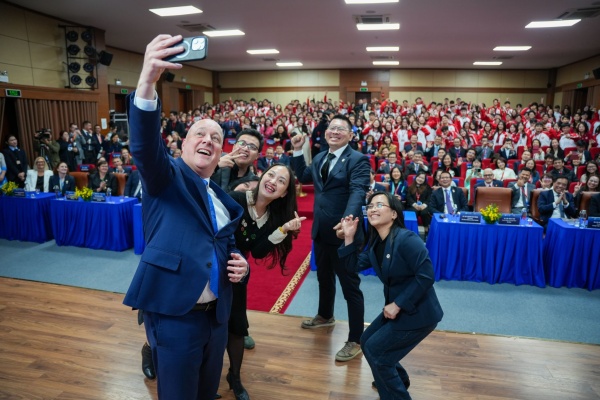
Prime Minister Christopher Luxon snaps some pictures with alumni at the New Zealand – Viet Nam EduConnect event.
AUT Vice-Chancellor Prof. Damon Salesa, Chair of Universities New Zealand's International Committee, represented Universities New Zealand to sign the Collaboration Arrangement with the Department of International Cooperation of the Vietnam Ministry of Education and Training.
The arrangement provides additional support to Project 89 scholars who wish to study in New Zealand. Project 89 is one of Viet Nam’s key initiatives to support its education sector, allowing local lecturers to pursue PhD study and postgraduate study overseas on fully-funded scholarships.
Following the success of education engagements during this trade mission, Amanda Malu, said New Zealand sees significant potential in strengthening education partnerships with Viet Nam.
“New Zealand will continue to expand the range of initiatives in Viet Nam across all levels of education, from schools to postgraduate study, to make it easier for Vietnamese students to engage in knowledge exchange, innovate and realise their dreams of studying abroad,”
“With Vietnam’s ambitious education and technology goals for 2045, our nation is well-positioned to support this journey,” she added. -
Hundreds of Brazilian high school students arrive at New Zealand schools
Over January and February, 200 students from Paraná and 100 from São Paulo arrived in New Zealand on a Brazilian state-funded scholarship that will have them spending a semester and term in New Zealand schools while staying with host families.
Chosen for their academic performance, attendance, and completion of an English course, these top students get a chance to immerse themselves in New Zealand's education system and culture.
New Zealand is considered a strategic partner by Paraná state and São Paulo. This programme highlights the success of increased educational cooperation between Brazil and New Zealand. In addition to improving English proficiency, the initiative also aims to develop intercultural skills.
Paraná's programme, launched in 2019, has sent 1,240 students to various countries, with more than 600 going to New Zealand.
Coordinator of the São Paulo programme, Simone Telles, said New Zealand was chosen for this programme due to our innovative education system, use of technology, the freedom given to students and the welcoming nature of New Zealanders.
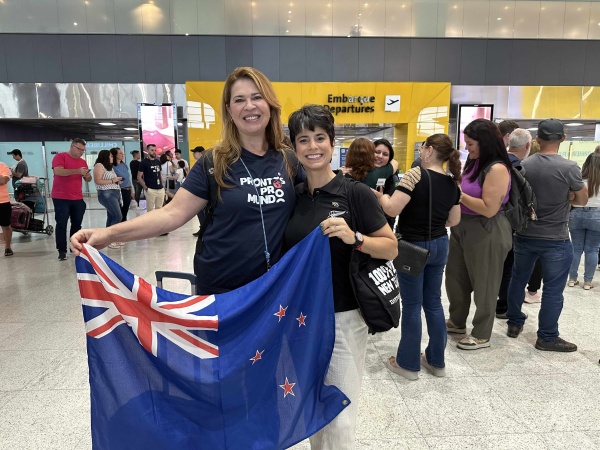
Simone Telles and ENZ’s Market Development Manager, Bruna de Natale: Education partnership between São Paulo and New Zealand.
In São Paulo, ENZ Market Development Manager, Bruna de Natale, attended one of the departure days for the group traveling to New Zealand. Bruna spoke to Luciangela Fonseca, mother of one of the selected students, Juan Fonseca. Luciangela said she felt “pride mixed with fear and emotion” and that the family felt privileged to get this opportunity.
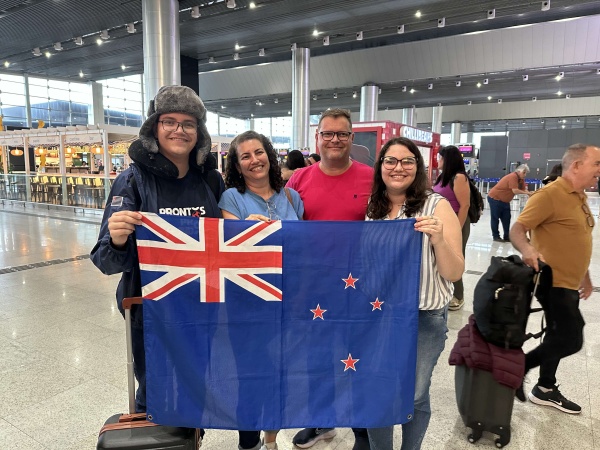
Juan Fonseca, his parents, and sister. Emotions at the departure for Auckland.
All programme costs are funded by Brazilian states, including transportation, education, food, accommodation, and leisure activities.
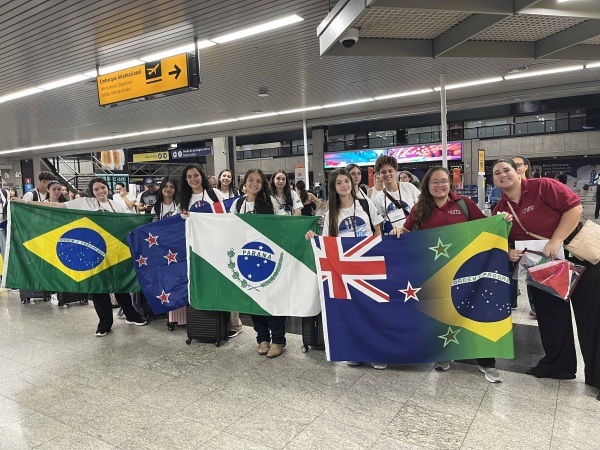
Paraná students departing in São Paulo.
- International students welcomed across New Zealand
-
From the CE: Boosting global connections in education
Kia ora koutou,
In March, I spent an incredible couple of weeks in New Delhi and Mumbai as part of the Prime Minister’s Trade Mission to India, and for the 2025 Asia-Pacific Association for International Education (APAIE) conference.
During the trade mission, I was pleased to witness, together with Prime Ministers Christopher Luxon and Narendra Modi, the signing of a refreshed bilateral Education Cooperation Arrangement (ECA) between New Zealand and India. Education is a key feature in the New Zealand-India bilateral relationship, with India the second largest source market of international students for New Zealand.
The trade mission also served as a valuable opportunity to grow our connections with the Indian Institute of Technology New Delhi (IIT Delhi) through the New Zealand Centre, which is at the heart of our education partnerships in India.
IIT Delhi is backed by all eight New Zealand universities and is a hub for joint research and advancing India’s Digital India vision in AI, data science and advanced engineering. Prime Minister Luxon spoke at the education event which saw the announcement of several education initiatives, including a scholarship package and virtual internship programme, aimed at deepening bilateral collaboration.
There is no doubt that New Zealand has made a splash in India, and we look forward to continuing the momentum.
Last week, the Government announced its Quarter 2 Action Plan for New Zealand with 38 actions focused on economic growth. Boosting international education and export education earnings is a key action under the plan. ENZ is currently leading cross-agency work to develop an International Education Growth Plan for the Prime Minister and Ministers, and will be undertaking a series of sector engagements in the coming weeks.
It is an exciting time, and I look forward to sharing more about this work in my next column.
Ngā mihi nui,
Amanda Malu
Chief Executive
-
US roadshow sparks interest in New Zealand universities
Education New Zealand Manapou ki te Ao (ENZ), together with Victoria University of Wellington, Lincoln University, the University of Auckland, and the University of Otago recently completed a successful tour of high schools across Hawaii. The aim? To inspire local students to think of New Zealand not just as a beautiful place to visit, but as a world-class place to study.
Across a week-long series of classroom presentations, university fairs, and dedicated sessions for school counsellors, the New Zealand delegation engaged directly with more than 300 students and families and connected with 25 high school counsellors.
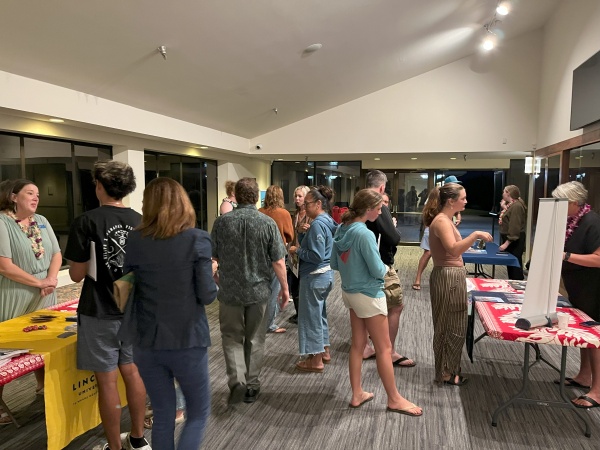
Representatives from New Zealand universities talking to students and their parents about their study offering.
Director of College Counseling at Le Jardin Academy, Scott Liedtke, said face-to-face conversations are powerful.
“When New Zealand educators come to Hawaii, it helps demystify studying overseas. Students and families can ask questions directly about cost, safety and credit transfer, and hear answers from the source,” he said.
ENZ also partnered with the New Zealand Consulate in Hawaii to host two events for local school counsellors. A breakfast at the New Zealand Chancery and a brunch at the Consul General’s residence allowed for deeper discussions and relationship-building within the education community.
Dan Cairns, Administration Manager at the New Zealand Consulate, described the events as more than just informational.
“Each gathering was designed to reflect different kaupapa, from celebrating international education to acknowledging our shared Polynesian connections – these moments created space to build people-to-people ties that go far beyond the classroom,” he said.
The impact of the roadshow was immediate. Each of the attending universities reported that at least two students had begun applications to study in New Zealand.
Director of Engagement, North America, DuBois Jennings said for ENZ, the roadshow represents a step towards long-term engagement in a region with shared cultural values.
“The clear appetite for New Zealand study options, shows there is real value in continuing and expanding this mahi,” he said.
Scott Liedtke echoed that sentiment. “New Zealand feels like a home away from home for many of our students. With its island lifestyle, cultural familiarity, and globally recognised education, it’s a natural fit,” he said.
“Here in Hawaii, we say the ‘coconut wireless’ — word of mouth — is strong. Once a few students head to New Zealand and love it, that news spreads fast,” Scott added.
For New Zealand study providers looking to find out more about the Hawaiian market, you can contact DuBois Jennings directly via email: dubois.jennings@enz.govt.nz
-
International students provide Asia perspective for Canterbury businesses
The students had signed up to take part in the Business School’s first Global Virtual Micro-Internship Programme, providing them with real-world research and industry experience, while enabling local businesses to tap into the expertise and insights international students can offer of their home countries.
A total of 35 mostly Commerce students participated in the three-week programme, working in nine teams across six local businesses which were keen to be involved. They were divided into the three Chinese teams, three Malaysian teams, and one each from Thailand, Indonesia, and Sri Lanka.
The programme had a competitive element, with the teams competing for a prize pool of $1500. They were judged on a range of criteria, with the most important factor the extent to which the research was designed, undertaken, and presented in a way that met their client’s needs.
Programme meets needs of students and businesses
Programme lead Will Shannon, also UC Business School’s Internationalisation Director, was excited to be able to develop the programme with the local business community, saying it met an unfilled need for international students wanting practical business experience, and highlighted the skills they had to offer.
The catalyst for the programme was the release of a report by Asia New Zealand Foundation Te Whītau Tūhono in mid-October which found that South Island businesses were keen to expand trade and investment links with Asia, but often lacked the right skills and connections to make it happen.
Fifty-seven percent of businesses surveyed identified language skills as a barrier to business, and 51 percent said they lacked knowledge of target markets and relevant organisations in Asia.
“We consistently get requests from international students wanting practical experience where they can apply their knowledge to real world problems,” Dr Shannon says. “So, when the Asia New Zealand Foundation report came out, we had the perfect combination of companies needing what international students can provide.”
Opportunity for international students to be involved
New Zealand’s border restrictions mean that close to half of the Business School’s international students are studying remotely, while others were unable to travel home for summer. This added impetus to the programme.
“We’d been looking for ways to engage students here over the summer break,” Dr Shannon says. “And while the offshore students have been catered for with online lectures, it can feel a bit isolating for them, so we have actively sought opportunities to involve them and get them the extra-curricular experiences that they need.”
He says it worked out well for all the teams, many of which were a mix of onshore and offshore students, because there were students “on the ground” in Asia who could easily talk to people locally. This added value to the insights that they were able to provide their clients.
The businesses represented a range of industries and included a rental car company, a business working in the motorsport industry and specialising in engine modification, a research agency looking to set up an office in Asia, a high-end safety product for the hair and beauty industry, and a truffle company gearing up to export.
“The enthusiasm of local businesses to be involved exceeded our expectations, as it’s the first time we’ve done this.”
The students had to tailor their approach to meet the varying needs of the clients, with the university providing mentors, workshops, and regular meetings to ensure it was a learning experience and to keep everyone on track.
For the New Zealand Truffle Company, co-founders Catherine and Matthew Dwan already knew that they offered a high-end product. They were keen for the students to help them research previously un-targeted Asian markets, likely consumer demand and, importantly, whether Halal certification would be needed in predominantly Muslim markets, as truffles are traditionally searched out by dogs.
Assigned to the truffle business was a Malaysian team and an Indonesian team which provided cultural and religious insights in their findings. The Malaysian team even provided a list of guidelines when engaging with businesspeople in Malaysia.
The programme proved to be a valuable experience for both students and clients and, based on its success, the university is already considering running it again in 2022.
Programme was “experience of a lifetime”
"The Global Virtual Micro-Internship Programme was the experience of a lifetime,” says Nuranisa Nabila Binti Zainudin, a member of the winning Malaysian team. “It provided me with a remarkable opportunity to learn, grow, and unleash my skills both personally and professionally while working for the best New Zealand company with an incredible team.”
“We know that international students are crying out for practical experience and sometimes their knowledge and skills are overlooked,” Dr Shannon says. “There was a lot riding on this, but they did what we knew they were capable of, so I think it would be a shame not to build on the experience.”

As a bonus, the students have built invaluable contacts in the New Zealand business community.
“We know that many jobs come about through connections,” says Dr Shannon. “It is great that the students have had experience of working with local companies in a professional setting, got endorsements for their skills, and will have gained confidence to go out and build their networks.”
He believes the programme has highlighted the unique skillset that international students can offer the community.
“We have amazing people here ready to contribute.”
-
Philippines roadshow showcases New Zealand’s premier ITP and PTE offering
The roadshow showcased the strength and diversity of New Zealand’s Institutes of Technology and Polytechnics (ITP) and Private Training Establishments (PTE) sub-sectors.
The roadshow brought together eleven New Zealand education providers: academyEX, NZSEG, Te Rito Maioha Early Childhood New Zealand, Ara Institute of Canterbury, Eastern Institute of Technology, NMIT, Southern Institute of Technology (SIT), Wintec, Future Skills, Auckland Institute of Studies and Otago Polytechnic.
A wide range of activities were held throughout the two-week programme, which included a media roundtable, agent seminars, school guidance counsellor workshops, and New Zealand Study Fairs.
These engagements helped to deepen education ties and raise awareness of New Zealand’s high-quality, hands-on tertiary education opportunities among Filipino students, parents, agents, and school representatives.
ENZ Market Manager Chortip Pramoolpol, ENZ Regional Director Asia Ben Burrowes and New Zealand Ambassador to the Philippines, H.E. Dr. Catherine McIntosh at the media roundtable in Manilla.
The media roundtable was held in collaboration with the New Zealand Embassy in Manilla and attracted 10 journalists.
The session highlighted the growing number of Filipino students choosing New Zealand and the shared values that underpin our education system – particularly in inclusive learning and vocational, work-ready training.
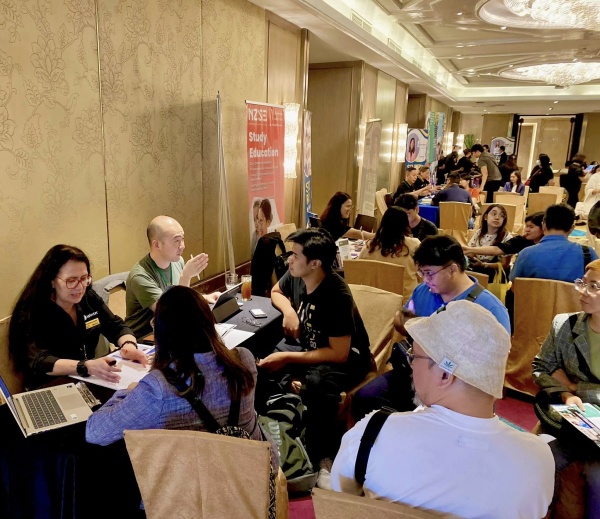
The New Zealand Study Fair in Manila.
The New Zealand Study Fairs across the three cities were buzzing, with 160 attendees in Manila, 165 in Bacolod, and 157 in Cebu.
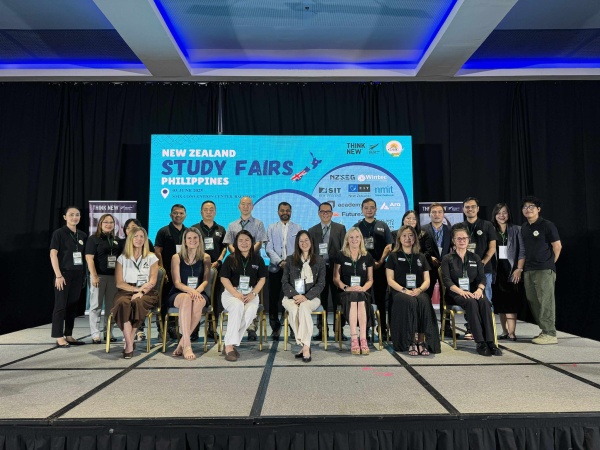
The New Zealand Study Fair in Baclod.

Providers talking to prospective students at the New Zealand Study Fair in Cebu.

Attendees of the Manila agent seminar.
The agent seminars in Manila and Chebu brought together agents who are eager to promote tertiary education in New Zealand to build connections with providers.
ENZ representatives provided a presentation on the latest official information on studying in New Zealand and resources for agents to promote New Zealand education. Immigration New Zealand (INZ) provided a recorded presentation on the latest visa information for the Philippines market.
In Manila, the education agent seminar attracted 37 attendees, while 11 agents participated in Cebu.
School engagement in the roadshow was also notable, with eight schools attending the school guidance counsellor workshop in Manila and 10 in Cebu.
ENZ Regional Director for Asia (excluding China), Ben Burrowes said this roadshow marks another exciting step in strengthening the education relationship between New Zealand and the Philippines.
“The strong turnout across all events and the enthusiastic engagement from agents, students, and school counsellors show there is a growing appetite for the quality education New Zealand offers,” he said.
“We’re proud to support our PTE and ITP partners in connecting with this key market, ENZ looks forward to building on this momentum in the coming months,” Ben added.
-
New Zealand Geothermal training expertise powers Indonesia's renewables journey
Indonesia has vast capability to generate geothermal power but has looked to New Zealand to provide targeted technical training in order to capitalise on its natural resources and support its renewables journey.
For the past three years, Waikato Institute of Technology (Wintec) has been providing that practical training through the Ministry of Foreign Affairs and Trade’s aid programme.
The programme builds on long-standing relationships with the Indonesian geothermal industry which date back to the 1980s.
New Zealand boasts an innovative and world-leading workforce
Geothermal New Zealand Executive Director Mike Allen says Aotearoa New Zealand boasts an innovative and world-leading workforce in geothermal science, engineering, and plant construction, and that there is obvious mutual benefit in sharing our skills and expertise.
“Students who have undertaken training in New Zealand always have a positive experience and when they return home, they are great ambassadors for us.”
“The geothermal industry is good at maintaining contact with those who have received New Zealand training, and many of them come back and work in the industry here.”
Mr Allen says the MFAT aid investment in the renewable energy space has also benefitted New Zealand in consultancy contracts, new business, research collaboration, and valuable long-term relationships. “The training we provide is very good for Brand New Zealand.”
How Wintec’s international education programme is helping Indonesia
What Indonesia specifically needed from Wintec’s international education programme was training in practical operational skills for their geothermal technicians and operators.
Since 2018, Wintec has been working with technical institutes and universities to incorporate practice-based learning into their courses and has also provided staff training directly to the geothermal operators.
“New Zealand has a strong history of apprenticeships and operator and technician training programmes,” says Jo Douglas, who manages the project for Wintec.
“We took the raw material from our curriculum and repackaged it to meet their needs. We have been involved in curriculum change, training the trainers, and changing their approach so inquiry-based learning and problem-solving is encouraged. We are delivering technical short courses on a range of subject matter in order to fill skills gaps.”
The programme has been hugely successful for Wintec. It has provided a range of technical training to over 700 participants. But Covid has forced changes to how the content is delivered.
Staff developed blended online modules which have seen students doing some online learning and then coming into digital classrooms to observe practical demonstrations by tutors. “We even had a tutor who built a model geothermal cooling tower in his living room and students had to interact with the demonstration online.”
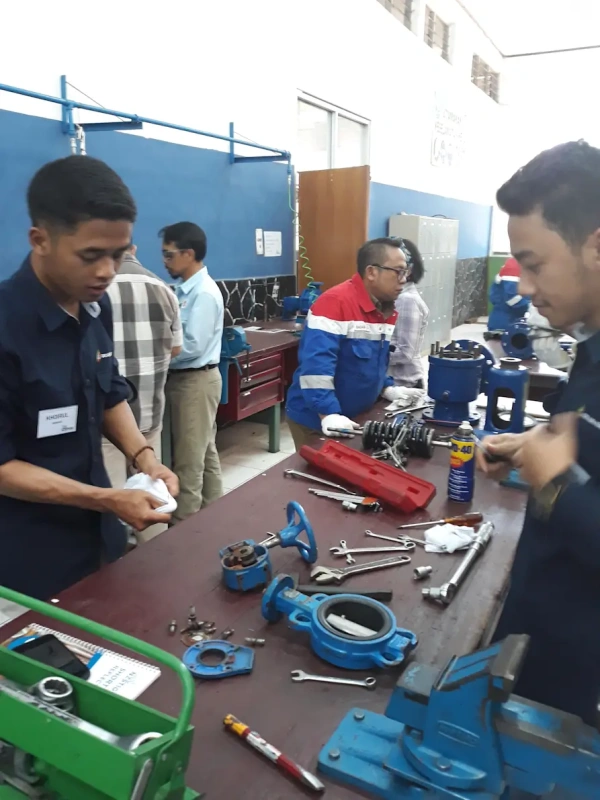
And it is not only the students who are benefiting. “It gives our tutors the chance to teach in entirely different situations, to take their core knowledge and adapt it to new circumstances and with different expectations. It challenges them and gives them the opportunity to see another perspective.”
This geothermal education story is one of many instances where New Zealand’s education providers are sharing their research, experience and education expertise with sectors or industries around the world. Facilitated by respective governments, a New Zealand education is helping other governments to help their people by addressing the country’s challenges or opportunities.
-
Around the world in five
Canada
Canada considers study permit cap tweaks as job losses mount
Despite possible adjustments to come, experts are warning of deepening financial and educational fallout from Canada's study permit caps.
Global
University impact rankings expand but remain volatile
Designed to showcase how institutions are working towards addressing the United Nations’ Sustainable Development Goals, this year’s Times Higher Education Impact Rankings edition is the biggest yet.
Asia
"Asian tigers" ramp up internationalisation amid big four woes
Territories and countries like South Korea and Hong Kong, part of the so-called “Asian Tigers” alongside Singapore and Taiwan, now view international students and intra-East Asian mobility as critical to sustaining economic growth in the region.
United Kingdom
Over 50 UK universities have dropped in the latest QS World University Rankings, with funding concerns emerging as a key factor behind the decline.
The United States of America
Can the US afford to lose its 1.1 million international students?
International students contributed $43.8bn to the US economy last year and created 378,175 jobs nationwide.
-
Putting a healthy smile on the dial of Fiji’s children
“I love working with children, particularly those living with disabilities and special healthcare needs who require more inclusive oral health policies and programmes.”
He spent the early years of his career working as a hospital dentist and teaching at the Fiji National University’s School of Dentistry and Oral Health but was ambitious to accomplish much more and knew he would have to study overseas to achieve his goals.
He travelled first to Portugal to enrol in a Master’s in Public Health and then to the University of Otago’s Faculty of Dentistry to undertake his Postgraduate Clinical Doctoral Degree in Paediatric Dentistry.
As a third generation Fijian of Indian descent, he describes his international education experience as “life-changing, academically and culturally fulfilling.”
But Jason says he could never have afforded to study in New Zealand without the support of a Manaaki New Zealand Scholarship, funded through the Ministry of Foreign Affairs and Trade. The programme sets out to build future leaders in developing countries by supporting students to upskill here.
Advocating for better oral health outcomes
Improving the oral health of young people drives Jason’s clinical and research work and he knows that implementing a preventative approach to tooth decay is key to achieving sustainable outcomes.
“The mindset in the Pacific is that people mostly don’t come to the hospital clinics for dental care, they wait for pain or symptoms before seeking help,” he says. “But we need to advocate strongly for prevention which is more cost-effective and acceptable.”
Arriving at the University of Otago in 2019, Jason embarked on his thesis researching the remineralisation potential of selected peptides (one of the building blocks of protein) in preventing tooth decay.
“Dental decay is prevalent, especially among children, but it is reversible in its early stages. The mainstay of prevention has been fluoride, but we proved that the peptides do have remineralisation potential. Investigation is now under way to learn how it performs alongside fluoride.”
“I think it has huge potential for the future. The dream would be that we have the next generation of children growing up without fillings in their mouths.”
Jason says this kind of research would not have been possible in Fiji. “I was very grateful for the experience at Otago. It was an environment that was both supportive and collaborative. It opened up networking opportunities for me. And those networks still support me today.”
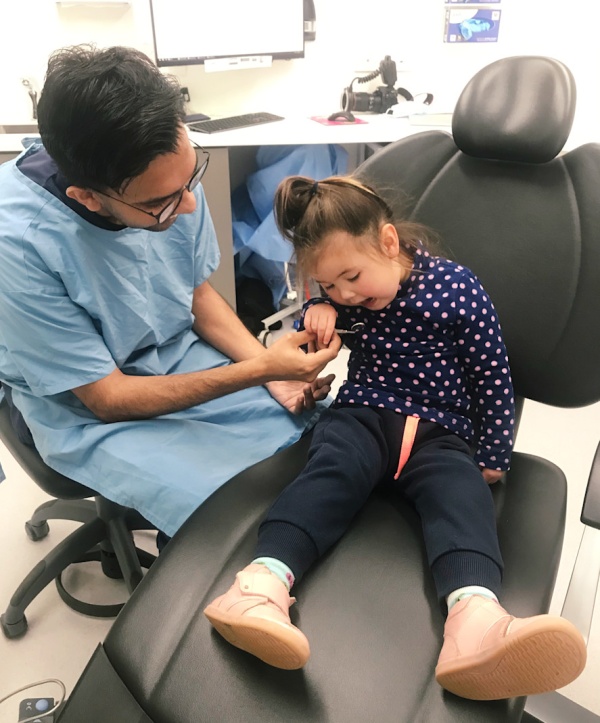
Jason also cared for patients at the faculty’s clinical facilities and theatre suites and provided on-call dental services for emergency patients after-hours at Dunedin Hospital, building close bonds with some of his young patients, especially those with special needs.
"The dream would be that we have the next generation of children growing up without fillings in their mouths."International education builds skills and confidence
After his graduation in December, Jason returned to FNU School of Dentistry with additional skills and new-found confidence. “I think that gaining a formal specialist qualification has given me a voice to continue to advocate for children’s oral health through dental education.”
He wants to establish preventative oral health programmes in schools and help improve the curriculum being taught to dental students in the region, integrating recent innovations and research evidence.
It’s something he has been thinking about for many years. “Hopefully now we’ll get this done.”
“I’ve expanded my knowledge, upskilled, and I think I have become more confident as an academic, and as a person. I’ve got my international education and training to thank for that.”
Manaaki scholar gives back to the community
Jason is certainly fulfilling the brief of the Manaaki Scholarship to give back to his community. He is maintaining his clinical hours, teaching the next generation of dental students, volunteering his services at an NGO-run paediatric cardiac care hospital, and mentoring students wanting follow in his footsteps by studying overseas.
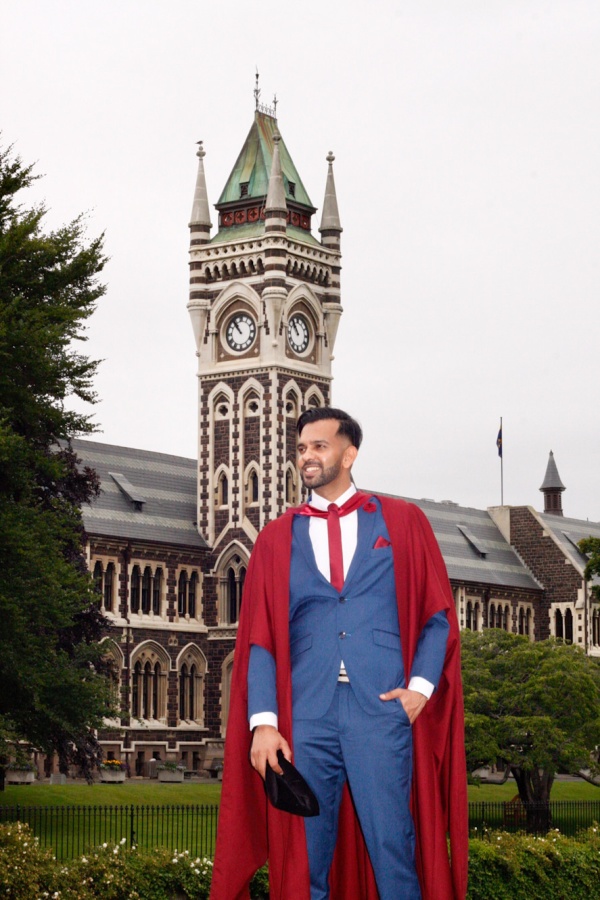
“International education is very important to Fiji as a developing country,” he says. “I thought it would be valuable to be able to guide students who would benefit from international scholarships in meeting their professional goals, while building capacity in the region.”
At heart, though, he is an academic and he hopes that in the coming years he can raise the research profile of the Pacific region and build a solid database which will help to secure the funding for much-needed oral healthcare programmes.
“My message is that there is no general health without oral health. It’s not going to be easy, but we need to start somewhere to get a voice for children and for the profession.”

